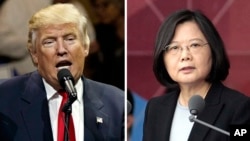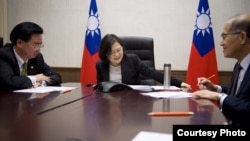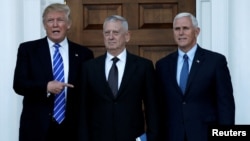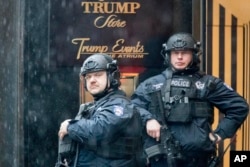China said Saturday it has lodged an objection to the telephone conversation U.S. President-elect Donald Trump had with Taiwan's first female president Tsai Ing-wen.
"We have already made solemn representations about it to the relevant U.S. side," China's Foreign Ministry said in a statement. "It must be pointed out that there is only one China in the world. Taiwan is an inalienable part of China's territory."
China claims democratically ruled Taiwan is part of its territory and has never renounced the use of military force to bring the island under Beijing's control. The U.S. broke diplomatic ties with Taiwan in 1979.
Trump brushed off criticism of breaking diplomatic protocol, responding in a message on his Twitter account, saying, "The president of Taiwan CALLED ME today to wish me congratulations on winning the Presidency."
Later, Trump said on Twitter "interesting how the U.S. sells Taiwan billions of dollars of military equipment but I should not accept a congratulatory call."
Trump's phone conversation with the president of Taiwan was roundly seen as an unconventional move that could risk raising tensions with China.
The call is believed to be the first such contact between a U.S. president or president-elect and a Taiwanese leader since the United States broke diplomatic ties with Taiwan.
In the phone call, Tsai expressed her hope that the U.S. would continue to support Taiwan’s participation and contribution in international issues, according to a statement released late Friday by Taiwan’s Presidential Office.
“They also exchanged views on the regional situation in Asia, as well as the future relationship between Taiwan and the United States. The president [Tsai] looks forward to strengthening bilateral contacts and to closer cooperation,” said Taiwan's government.
Trump’s spokeswoman Kellyanne Conway said the president-elect is “well aware” of what U.S. policy has been on Taiwan.
“President-elect Trump is fully briefed and fully knowledgeable about these issues on an ongoing basis, regardless of who is on the other end of the phone,” Conway told CNN Friday.
Tsai speaks perfect English and no interpreter was needed in the call that lasted more than 10 minutes.
Taiwan Minister of Foreign Affairs David Lee and Tsai’s National Security Advisor, Joseph Wu, were present during the call as well.
White House, State Department
The White House was not told about the call until after it happened, a senior administration official told The New York Times.
It said, however, there was "no change" to the United States' longstanding "one China" policy after Trump's discussion with Tsai.
"We remain firmly committed to our 'one China' policy," Ned Price, a national security spokesman for President Barack Obama, told Reuters. "Our fundamental interest is in peaceful and stable cross-Strait relations."
The State Department declined to comment if it was notified or asked to brief the transition team on current U.S. policy toward China and Taiwan prior to the phone call.
“Our job is to offer support whether that’s in terms of facilitation, translation, or context, which we have done and will continue to do,” said State Department spokesman John Kirby on Friday.
“But the degree to which it’s utilized is really for the transition team to decide, and it’s really more appropriate for them to speak to," Kirby added.
Reince Priebus, the chairman of the Republican National Committee who was named by Trump as White House chief of staff, met with Tsai last October while leading a Republican delegation to Taiwan.
A game changer?
Experts said the conversation between Trump and Tsai shows a clear break with the so-called pivot to Asia and could be a “game-changer.”
“While one phone call certainly can’t replace a clear strategy for Asia or the rest of the world, President-elect Trump has shown guts in shaking up the status-quo on foreign policy issues that are of supreme importance,” Harry Kazianis, director of the Center for the National Interest Defense Studies, said.
John Bolton, who was U.S. ambassador to the United Nations during former president George H.W. Bush’s administration, met with Trump Friday.
Bolton, who emerged as a contender for the next secretary of state, had advocated for “an upgrade” of Taiwan’s relations with the U.S.
“The new U.S. administration could start with receiving Taiwanese diplomats officially at the State Department; upgrading the status of U.S. representation in Taipei from a private 'institute' to an official diplomatic mission; inviting Taiwan’s president to travel officially to America; allowing the most senior U.S. officials to visit Taiwan to transact government business; and ultimately restoring full diplomatic recognition,” according to a commentary article Bolton wrote for the Wall Street Journal earlier this year.
Trump priorities
Trump also talked by phone Friday with Afghan President Ashraf Ghani, Singapore Prime Minister Lee Hsien Loong, and Philippines President Rodrigo Roa Duterte.
He also promised to have most of his Cabinet posts filled by the coming week, calling his nominees "tremendous people."
The president-elect made the statement in an interview aired on Fox News Friday, a day after naming Marine Corps General James Mattis as defense secretary, an appointment that will be made formal on Monday.
Meanwhile, Vice President-elect Mike Pence was quoted Friday in a Wall Street Journal article as saying the Trump administration will focus on illegal immigration, abolishing and replacing Obamacare (the Afordable Care Act - health care reform signed into law during the Obama administration), strengthening the military and filling the vacant post on the nation's Supreme Court.
"Washington, D.C., is going to get an awful lot done in a short period of time," Pence told the Journal.
New York security costs
Also Friday, two members of the New York City Council began an online petition, asking Trump to provide federal funds to reimburse the city for the increased security costs -- $1 million a day -- to protect his family.
Trump lives - and his transition team is working out of - Trump Towers in Manhattan.
"We ask you to commit the necessary federal funds to reimburse New York for all costs of protecting you and your family, both before and after your inauguration as president of the United States of America," the petition said.
Police have used barricades and dump trucks filled with sand to help fortify the area around Trump's building.
The city has estimated, according to the petition, that the cost of security at the New York residence could reach $4 billion by the end of a four-year term.
Bill Ide in Beijing contributed to this report.







